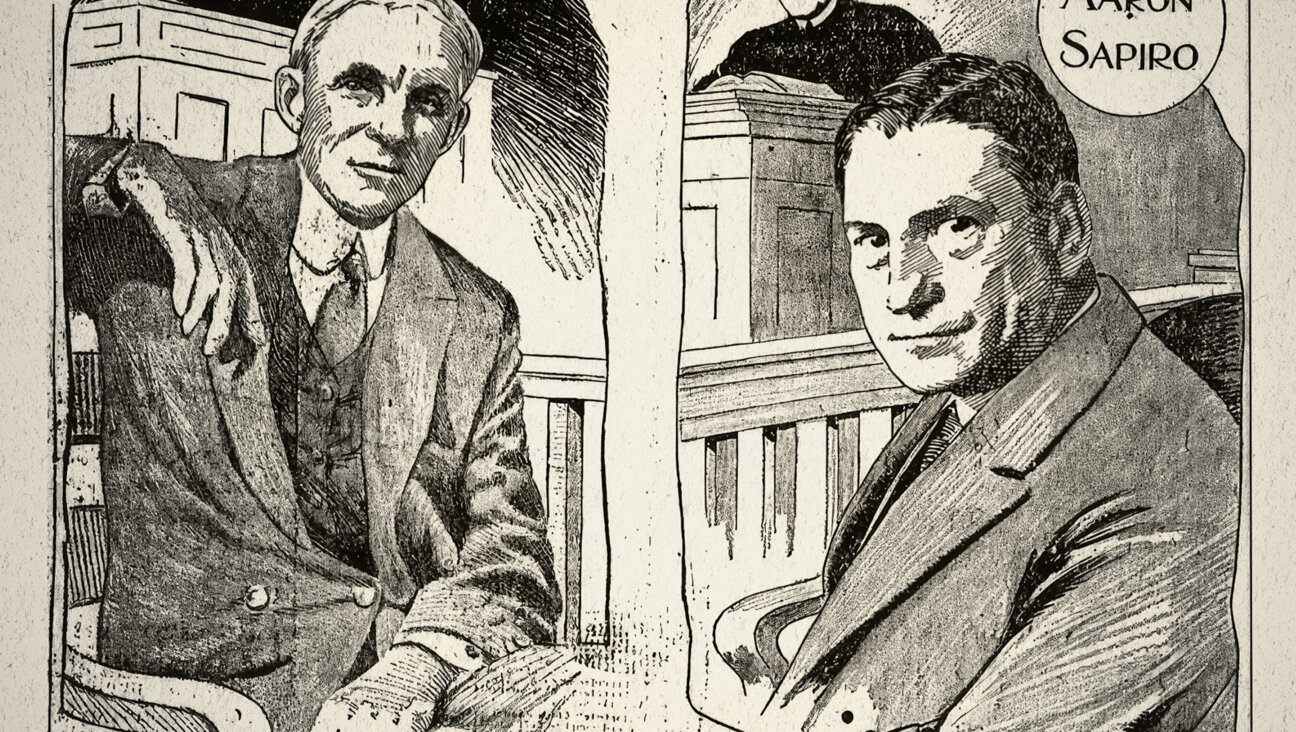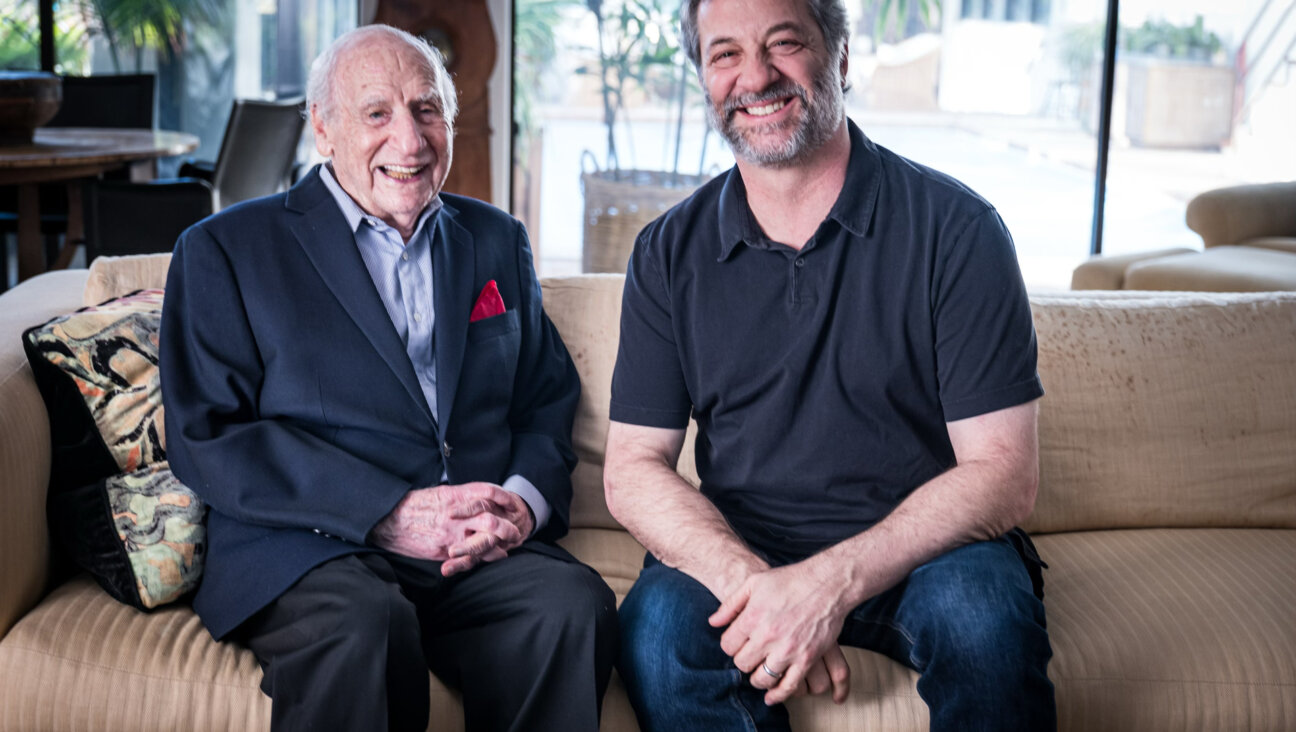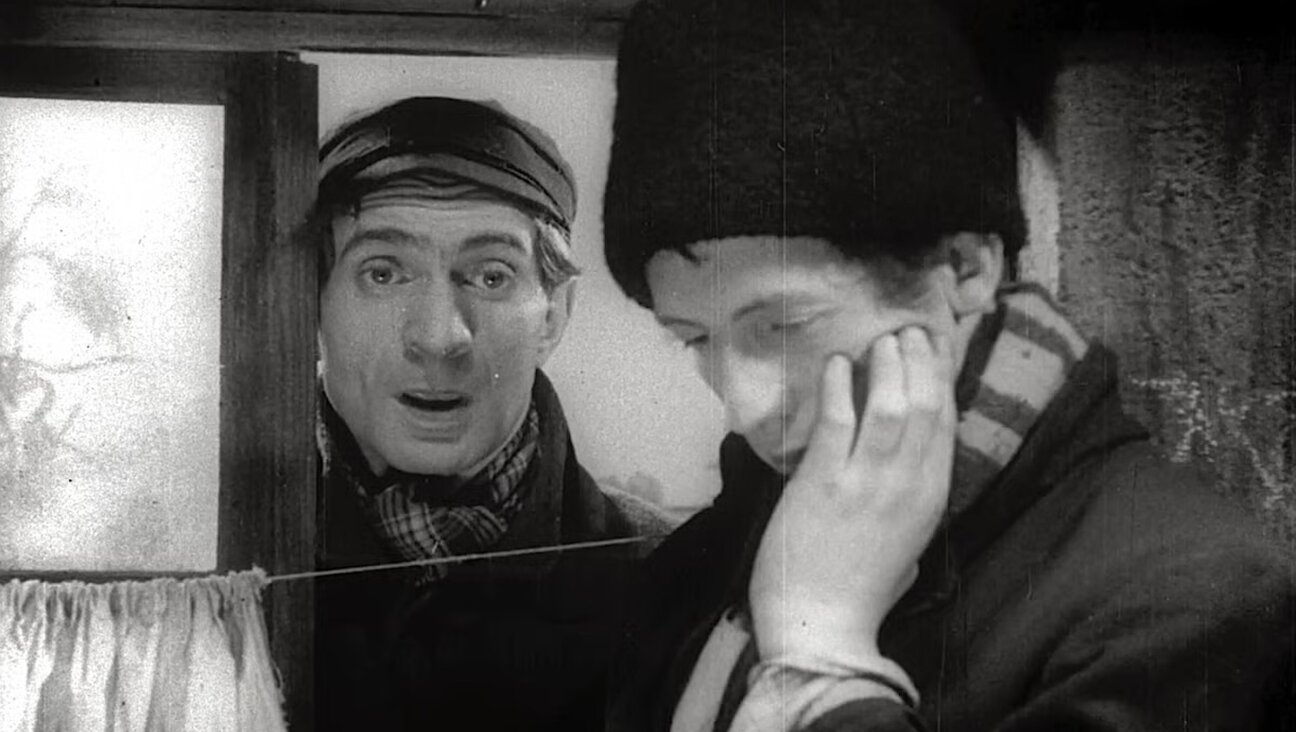How ‘Star Wars’ Became America’s Talmud [SPOILER ALERT!]

Graphic by Angelie Zaslavsky
Please don’t read this article if you haven’t seen Star Wars yet — it’s one big spoiler. But whether you have seen it, plan to see it, or couldn’t care less, in fact this article is about… you.
“The Force Awakens” is a Talmudic film, struggling with what critic Harold Bloom has called the anxiety of influence. In addition to simply being a lot of fun, it is a tale whose heroes, villains and filmmakers are all struggling with the past — the weight of the vast Star Wars legacy, with six episodes, billions of dollars, and trillions of action figures in the rearview mirror. Like Walter Benjamin’s angel of history, it is being blown toward the future but can only see the past.
It’s an interesting irony that the closest stand-in for the film’s (Jewish) director, J.J. Abrams, is not among the heroes of the movie but its most memorable villain, Kylo Ren. From the trailers and posters, you’d think that Kylo Ren is the new Darth Vader. And I’m sure he’s being marketed that way by Disney.
But in fact (here come the spoilers; I warned you), Kylo Ren only wishes he was Darth Vader. In fact, he can’t get it right. He’s haunted by the ghost of a grandfather he never knew, and all too aware that he cannot fill his ancestor’s shoes. Or mask. He’s a petulant child, throwing temper tantrums with his lightsaber. And beneath the anger is a profound uncertainty. It’s a testament to the film that I didn’t know how his climactic decision was going to turn out.
In a way, Abrams and “The Force Awakens” is similarly haunted. The consensus — much to the joy and/or relief of fans — is that the film is excellent, and better than all three of the much-maligned prequels. But nothing short of a mystical experience can really live up to the promise of the original two films.
Indeed, perhaps the greatest flaw of the film is its heavy debt to previous installments. As in Episodes 4 and 6, the main plot is about destroying a big weapon that can blow up entire planets. As in Episode 4, the first reel of the film involves a droid with a secret message stranded on a desert planet and discovered by the hero. As in Episode 5, the black-clad villain is, in fact, the servant of an even more sinister lord who we see only in hologram.
To be sure, many of the quotations from previous films are a delight. When I saw the film on its opening night, the entire theater burst into applause at the entrances of Han Solo, Chewbacca, and Princess Leia. And the Millennium Falcon, C3P0, and R2D2.
But “The Force Awakens” so recapitulated past films that, at times, it felt like an echo of a mythic past. Just like Kylo Ren is haunted by Darth Vader, so J.J. Abrams felt haunted by “A New Hope.”
This is a profoundly Jewish crisis. Not only has it been explored by Jewish figures like Bloom and Benjamin, it is intrinsic to the recurrent sense in Jewish intellectual history of being heirs to an impossibly heroic past. “Yeridat Hadorot,” the notion that each generation is “lower” than the preceding one, is one iteration of it. The veneration of the Patriarchs, Talmudic Sages, and ‘Gedolim’ of past centuries is another. Even the recollection of the glories of the Jerusalem Temple suggest that the lost past haunts us, and yet we come up short. We, like Kylo Ren, are but an echo of the mythic past, yearning to continue its work but aware of how we come up short.
This disjuncture is not uniquely Jewish — arguably, it is the central theme of “Don Quixote.” But it is a tension that has had a uniquely Jewish iteration. The Jew, in anti-Semitic tropes of modernity, cannot be an authentic genius. He can comment on genius, deconstruct genius, but he can never be the genuine article, precisely because of his self-awareness and self-reflexivity.
To be sure, he may seem like a “genuine article,” but the scare quotes are always visible. Bob Dylan, for example, may seem at first like an authentic folkie from the north country, but in fact he is Robert Zimmerman, quoting Americana, not entirely part of it. There’s a reason one of his albums was titled “Love and Theft.”
Of course, Bob Dylan really is a genius. His lyrical innovation alone surely meets the definition. But notice that he is a peculiar kind of genius: one haunted by some notion of the authentic, which he can mimic, remix, and reconfigure, but never quite create sui generis.
Every X-Wing Fighter in the new “Star Wars” film is the same. J.J. Abrams has created a masterpiece of action, myth, character, and plot. But it, too, is not sui generis; it is preceded by the original, quotes the original, sometimes genuflects before the original. How could it be otherwise? “Star Wars” is American scripture now, and Abrams cannot escape being a commentator on it.
Of course, all of this is myth, not reality. Perhaps one reason Episodes 1-3 were so disappointing was that they de-mythologized Darth Vader, depicting him as an annoying brat and moody adolescent. Episode 7 does the opposite; it is about the myth of Vader, not the reality.
The only characters able to escape from this conundrum are the two young heroes, Rey and Finn, who know less about the history of “Star Wars” than most people in the audience. They’ve heard rumors, stories, myths – but they weren’t born when the events of Episodes 4-6 took place, and they have never met a Jedi. Unburdened by history — indeed, ignorant of it — they are able to seize their own destinies.
Is there any hope, then, for those of us who must be heirs rather than benefactors, commentators rather than revelators? Can we ever transcend the Jewish role of self-reflective, Talmudic, Seinfeldian commentator on life and, simply, live?
The very end of the film offers one possibility, though more a Christian than a Jewish one. Luke Skywalker, who, the film’s opening crawl tells us, has “disappeared,” is finally found, on a remote island in the middle of a vast sea on a remote planet. Surely, if Han Solo, Kylo Ren, and the rest are haunted by the past, Luke has been utterly captured by it. He cannot face the present, and lives as a recluse.
But in the film’s closing gesture, Rey, who has no memory of the past, makes contact with Luke, who is trapped in it. She offers him his lightsaber back, demanding that he return to history.
As the scene fades out, it’s not clear whether Rey is Elijah, and Skywalker is the Messiah set to return — or whether Skywalker has, all this time, actually just prepared the way for Rey to be the redeemer. Maybe we’ll find out in Episode 8.
Either way, the redemptive moment of the film’s conclusion is a messianic one, which is to say, a rupture of the existing order – a new revelation. Otherwise, all we can do is quote.
Jay Michaelson is a contributing editor of the Forward.
















